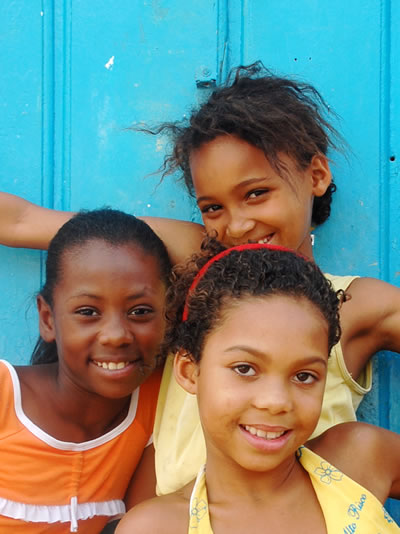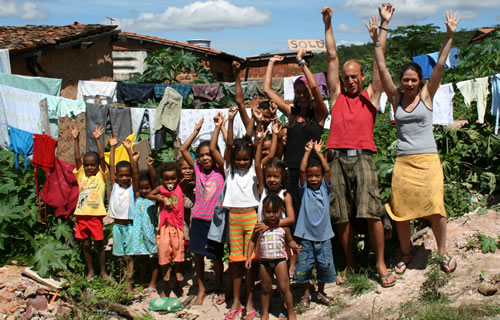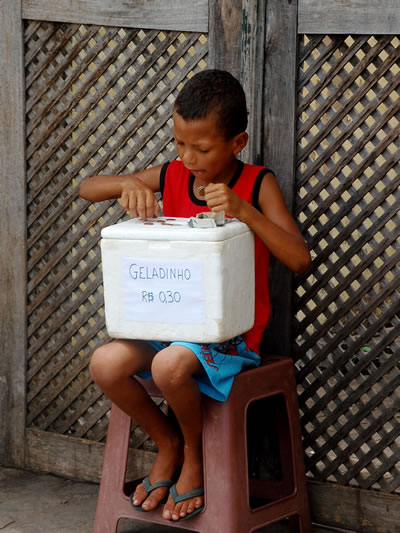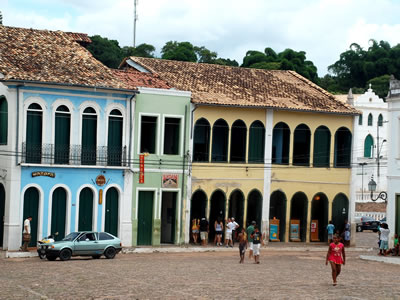|
Helping Underprivileged Children Of Lençois
A Volunteer Project in the Chapada Diamantina Region, Brazil
Article and photos by Lies Ouwerkerk
Senior Contributing Editor
4/2010

|
|
Kids in Lençóis.
|
The Beginning
Once British trekking guide Olivia Taylor set foot in the wooded mountains of Chapada Diamantina, she was sold to the region, and never looked back. She settled in Lençóis, a small colonial mining town about six hours driving from Salvador de Bahia, and known for its considerable wealth and fame during the height of the diamond boom of the last century. Although it had sunk into oblivion since then, tourists started to trickle in following the founding of the Chapada National Park, Lençóis being its gateway. Recognizing a niche, Olivia opened Pousada Dos Duendes, a charming guesthouse for independent travelers of all ages. Occasionally, kids from the neighborhood would drop in to hang out with guests and staff, especially those from poor families who were left to their own devices and often had to take care of their younger siblings while their parents were out to work. Many of the kids were not attending school regularly. Or when they did during the half-day shifts of Brazil’s public school system, it seemed they were not learning all that much.

|
The lot has been purchased for the Pousada.
Photo courtesy of Pousada Dos Duendes.
|
|
Development of the Project
Once the idea was born to help local underprivileged children with their school work, the pousada started to receive small donations from their guests who passed through and witnessed the need with their own eyes. The books, pencils, and educational tools they were able to purchase, generated more enthusiasm from the kids in turn. Soon the project outgrew its limited capacity in the pousada, and a house of its own was needed. Just at that time, both a run-down house behind the pousada came on the market, and a generous Dutch guest donated a substantial amount of money, enough to purchase the house and fix it up for use. Volunteer-run Projecto Casa Grande (Big House Project) has been growing ever since. It currently caters to two groups of about 20 children, one coming in on mornings, another in the afternoons.
Volunteering
“In the beginning I felt quite overwhelmed and sometimes discouraged” admits volunteer Natalie Hoskin from the U.K., who has been working for four months in Casa Grande as part of a “one year abroad” requirement for her university language program. “I quickly realized that I had to give up some of my illusions and too idealistic goals I had previous to coming here. I had dreams of making big changes in the lives of these children, and motivating them to pursue a higher education. During my time here, I have learned to see them in their own context, to set smaller goals, and to celebrate the little victories instead: empowering a boy who could not complete the alphabet past the letter e, to proudly spell and write his own name, or teaching a girl who was not able to count past three without skipping to ten, to properly add and subtract small numbers.”
The Children of Casa Grande
Adds volunteer Mariana Ruggieri, a university student from São Paulo: “we have also learned not to ask too many questions when children return after a hiatus of a few weeks, but simply provide a safe place where they can forget at least for a few hours about some of their difficult life circumstances or the work they have to do to supplement the family income. There are a lot of bruised kids here, and obviously they do not always have their bad behavior in check. But usually they are also very needy and starving for some attention”. The reality is that children here often start working at a very young age, first by helping their parents at home or on their jobs, and later by using their entrepreneurial skills on the street or along the many hiking trails around Lençóis by selling snacks, or ice cream and cold drinks from a cooler.

|
|
Ice cream vendor counting his blessings in Lençóis.
|
|
“Progress”
These days, homework has somewhat taken a backseat at Casa Grande, and "progress" has gradually taken on another meaning. It may now also include basic hygiene rules for kids from homes with inadequate bathroom facilities, who come in dirty or don’t brush their teeth, for instance. Each child participating in the project has an own toothbrush that stays in the house. “Progress” may also entail instilling respect for people or other living creatures in children who have had to take care of themselves from very early on and mainly spend their time in the streets where they learn to swear, fight with each other, or play cruel games with animals.
Extra-Curricular Activities
Dan Sgalia, a recent graduate from Vermont, who volunteered here in a previous gap year and has now returned to Lençóis to take on a managerial role in the pousada, says: “concepts such as a sense of pride and ownership are pretty alien to the children of Casa Grande. We have tried to get them involved in doing something for the project, like helping to paint the house. Or we organize ‘clean up the litter’ days in the streets of Lençóis to foster some respect for their surroundings. We also try to make the program more fun with the limited means we have available. For instance, we instituted ‘Friday Fun Days’ for every student who comes in at least three times a week. We do art activities, offer capoeira dance classes, make bread, or organize trips to the river. When I remember the things I did as a kid and look at the differences these made to my life, I can only hope that I have brought some more perspective, motivation, knowledge, or joy to some of the kids here”.

|
|
The streets of Lençóis.
|
|
Plans for the Future
In the meantime, founder Olivia Taylor is not sitting still. Her wish list for Casa Grande keeps growing as the project advances. First of all, she is in the process of developing closer ties with the schools in Lençóis, in order to make the classes in Casa Grande more focused. She is also hoping they can soon afford a permanent, paid staff member — ideally someone familiar with Brazilian culture, and with the challenges in the Chapada region in particular. “It is important for the kids of Casa Grande to have a stable person in their lives when there is already so much instability. Therefore, we also prefer to have volunteers who can stay here for longer periods of time”. Thirdly, when enough funding would become available, Olivia would like to start providing food, as many children’s diets are limited to rice, beans, and cheap sweets only. And last, but not least, there is a plan to buy an adjacent lot and create a playground, a garden, and an area to raise some animals.
Benefits
For Natalie Hoskin, who will soon return to Great Britain, the gains of volunteering here have far outweighed the costs. An avid hiker, she has had the opportunity to partake, at a very reasonable price, in the many outdoors activities that the pousada organizes for its guests, from trekking and mountain biking to horse riding and kayaking. The pousada has a team of very knowledgeable and experienced guides to explore the splendid nature around Lençóis with its mountains, peaks, woods, rivers, waterfalls, and caves. A big bonus has also been the fact that the project does not charge a fee, and provides meals and lodging. And of course, Natalie brought her already existing knowledge of the Portuguese language near perfection during her stay in Lençóis.
What she has found most gratifying of all, however, is the fact that she could give love to children who don’t receive it at home. “It will be very hard to part from them” she concludes, “and although it was a pretty demanding job and I had to learn a lot as I went along, I would not like to have missed a second of it. It has been an absolutely invaluable and life-changing experience for me, and my view on life is now totally different from what it was before.”
For More Information
For prospective volunteers who need to improve their knowledge of Portuguese (a reasonable command of the language is required for volunteering at Casa Grande): ICI Instituto Cultural IDIOMA Brasil. The school provides both individual and group classes.
|
Lies Ouwerkerk is originally from Amsterdam, The Netherlands, and currently lives in Montreal, Canada. Previously a columnist for The Sherbrooke Record, she is presently a freelance writer and photographer for various travel magazines.
|
